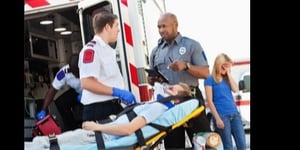
One of the leading causes of Traumatic Brain Injuries, or TBIs, in the United States is from falls. A little over 35% of TBIs result from falling, and falling causes 50% of TBIs among children up to 14 years of age, and 61% of TBIs in people 65 and older.
Here are some common scenarios for falls:
Windows: Falling out of a window is a serious risk for younger children, which is why you need high-quality window guards and/or window stops that prevent windows from opening more than a few inches. Keep furniture away from the windows to reduce the temptation of young children to climb up to one.
Stairs: For infants, toddlers, and older adults, stairs are particularly hazardous, though even healthy, able-bodied young adults can slip and fall. Your stairs should have a secure handrail, and there should be no loose steps or loose/broken treads. Any stairs or isolated steps should also be well-lit and free of small objects that could easily cause someone to slip.
Bathtubs: People can slip and receive a hard blow to the head while bathing. Using rubber bath mats helps. Seniors could also benefit from special bath chairs and a walk-in configuration for shower stalls, so that they don’t have to climb over the edge of a tub when taking a bath. And obviously young children need to be supervised.
Medical conditions: People who are prone to dizziness and light-headedness or have poorer balance are more susceptible to falling and possibly suffering a TBI. People who experience seizures are at a higher risk. A lot of medications have side effects, which include dizziness, poorer coordination and balance, and moments of blacking out, so be aware of this.
Bad weather: Pavement slick with ice or rain increase the likelihood of falling and possibly striking one’s head against concrete or other hard surfaces. In bad weather, minimize the risk of slipping by wearing shoes with good traction and keeping an eye out for black ice and other obstacles.
Playgrounds: Falling off playground equipment is another potential source of head injuries. Try to avoid playgrounds where the play sets are located on hard surfaces such as concrete, asphalt, and even grass over hard ground; relatively safer surfaces include mulch, sand, and rubber mats. Check that the equipment is sturdy and safe. And even in a safe playground know your child’s capabilities and keep an eye on them.
Next Blog: Most Common Personal Injury Accidents that a Chiropractor Can Treat


